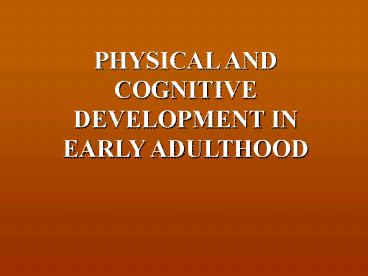PHYSICAL AND COGNITIVE DEVELOPMENT IN EARLY ADULTHOOD - PowerPoint PPT Presentation
1 / 12
Title:
PHYSICAL AND COGNITIVE DEVELOPMENT IN EARLY ADULTHOOD
Description:
Keep more vital capacity, muscle, response speed. Exercise. Only one third get enough ... Physical Fitness. Substance Use. in Early Adulthood. Cigarettes, ... – PowerPoint PPT presentation
Number of Views:126
Avg rating:3.0/5.0
Title: PHYSICAL AND COGNITIVE DEVELOPMENT IN EARLY ADULTHOOD
1
PHYSICAL AND COGNITIVE DEVELOPMENT IN EARLY
ADULTHOOD
2
Initiation into Adulthood
- The Transition to Adulthood in the United States
- Religious
- Sexual
- Social
- Educational
- Economic
3
Initiation into Adulthood
- Implications of the Lack of an Initiation
Ceremony - Adultoid adolescents who are less sure of
their identity and less self-reliant than other
adolescents of the same age
4
Physical Development
- The Peak Is Reached
- Physical changes slow down
- Organ Reserve Part of the total capacity of our
bodys organs that we do not normally need to use
5
Aging and Athletic Performance
6
Motor Performance in Adulthood
- Athletic skills peak between 20 and 35
- Decline gradually until 60s or 70s, then faster
- Continued training slows loss
- Keep more vital capacity, muscle, response speed
7
Exercise
- Only one third get enough
- At least 30 minutes moderate five or more days a
week - More often, more vigorous is better
- Around one third of North Americans are inactive
- Women
- Low SES
8
Physical Development
- The Effect of Lifestyle on Health
- Choices of Food
- Use of Alcohol
- Use of Tobacco
- Physical Fitness
9
Substance Use in Early Adulthood
- Peaks from 19-22 years, then declines
- But up to 20 ages 21-25 are substance abusers
- Cigarettes, chewing tobacco
- Alcohol
- Binge drinking
- Drugs
- Marijuana
- Stimulants
- Prescription drugs
- Party drugs
10
Cognitive Development
- Intellectual/Ethical Development
- Dualism
- Relativism
- Commitment
11
Cognitive Development
- Womens Way of Knowing
- Silence
- Received knowledge
- Subjective knowledge
- Procedural knowledge
- Constructed knowledge
12
Patterns of Work
- The Phenomenon of the Dual-Career Family
- Men helping out more at home
- Paternal child care
- Home-based work

